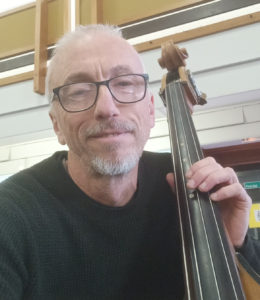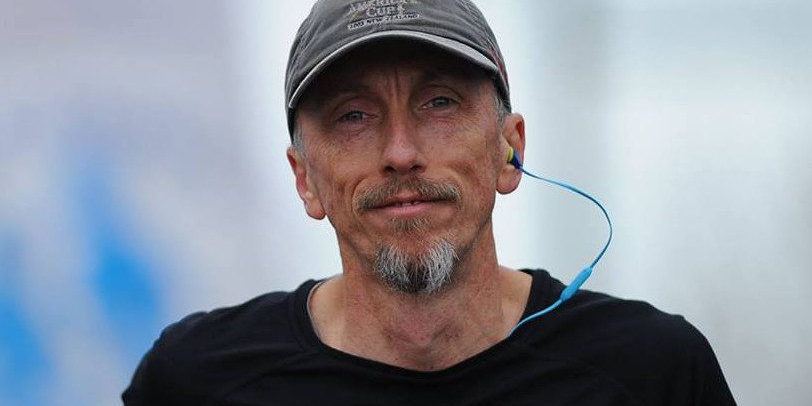Book of the Month: ADHD
Sean, 59, from New Zealand, joined the Human Library in 2022. He was first published at a local event in Whangarei. A friend of his organized the event and called him up to hear if he would be interested in becoming a Book, and it did not take much persuasion for him to sign up, “I thought that sounds really cool, and I loved the ‘Unjudge Someone’ approach”. He was published with the topic ADHD and has since joined our online bookshelf as well.
Discovering ADHD
Sean’s journey to discovering his ADHD began with a surprising twist. While he has had ADHD all his life, it remained hidden, even from himself.
“I was actually in denial when it first came up. I was seeing a therapist, and he said, well, maybe there’s a bit of neurodivergence happening here. And I was quite indignant and said: ‘I’m not autistic and I can’t have ADHD because I know where my keys are!’, which is really funny because a little while later, I actually lost my keys for two days and didn’t even notice. He was right though, because all of the problems I was working on with him were actually due to my undiagnosed neurodivergence.”
After a relationship breakup, Sean became quite anxious, so started medication for the anxiety. After a short while, the medication removed the anxiety, but several other things started to happen to him. “All of a sudden, I couldn’t remember anything. It would take me three attempts to send an email, and I was really disorganised, which was very unusual for me. So, I started down this process of understanding what this neurodivergence thing was about and went through a big process of diagnosis. It turns out suppressed anxiety was my main masking method.”
At 58 years old, Sean was diagnosed with ADHD.
Coming to Terms with ADHD
When Sean was first diagnosed with ADHD, he found it hard to digest and struggled to process it. “When I first found out, it was quite a shock to the system. There’s a lot of relief that you finally know what’s going on, but also so much grief for what could have been different. After getting support and understanding, the world started making more sense”.

Sean with his double bass.
He found that medication, therapy and coaching made the difference for him, “Medication is not a magic pill that makes you normal. I’m not normal. But it gives me access to capability. Things that I realise have been hard for me to do all my life are now possible”. Self-care is crucial after a late diagnosis, and he adds, “I’ve also recently started playing double bass in an orchestra. Music is amazing for my brain”. When asked if he still feels like the same Sean from before the medication, he replies, “Yes and no. I am the same Sean. I have the same history. But looking back and understanding how I thought and felt about things, I feel very different now. Who I am is fundamentally the same, but my emotional response is very different.”
Sean also mentions how fortunate he felt after disclosing the diagnosis to his workplace and how supported he felt. “I went to my boss and said, hey, I’ve just had this diagnosis, there are some things happening for me. And his response was to ask what I need and how he can help.” He acknowledges that not everyone has the same experience as him and says about his employer, “It’s really amazing that they are willing to look after their employees.”
“Our job as humans is to be the best human being we can be with whatever we’ve got. Whatever brain you’ve got, whatever circumstance you are in, you turn up as your best person and try to be the best you can be. Managing my ADHD is just part of who I am.”
Challenging Misconceptions
ADHD stands for Attention Deficit Hyperactivity Disorder. But for Sean, it’s not a deficit of attention at all, but quite the opposite, “It’s all the attention all the time!” He also describes the common misconception that hyperactivity doesn’t always show up the same way, “It isn’t all bouncy five-year-old boys”, but it can also be internal hyperactivity, like overthinking.
“People do ask, doesn’t everybody have this? And yes, being distracted, intense or very emotional is fairly common. The difference is that for many neurodivergent people, they are much more extreme. For both neurotypical and neurodivergent people, if something upsetting happens, both will get upset and then calm down again. The neurodivergent person will often get way more upset and take much longer to get back to a normal state of regulation. It’s much harder.”
Being a Part of the Human Library
When the conversation turned to being a part of the Human Library, Sean talked about one of his most memorable readings. “This guy turned up and checked me out as a Book. He told me: ‘I’ve got a young son, he’s so bouncy and uncontrollable. He’s so busy and so hyperactive. I don’t know what to do, and maybe he has ADHD’. I said, ‘I can’t diagnose your son, but here are some places you can go and talk to’. There was a pause, and he then talked about himself, that there are all these things that he knows he should do, but he just can’t do them, and that he feels on his own and can’t talk to his wife about it, and his parents think he’s ridiculous. I knew exactly what he was feeling and just wanted to give him a big hug. It was an incredibly moving moment.”
For those seeking to understand ADHD, Sean advocates visiting the Human Library and engaging with the real experiences of other people. “I think everyone should come along to the Human Library and read some Books and get a perspective from people who are different. It’s just that connection. You sit and talk to a group of people from all sorts of cultures all over the world, with different experiences, and come away with a better understanding. It’s amazing.”
Want to support our work? Click here to donate.
Read the previous Book of the Month: Disabled and Gay.





